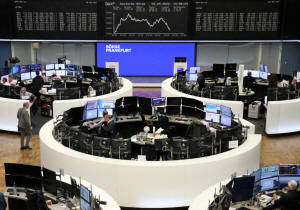Stocks limp toward biggest weekly fall of the year
 Send a link to a friend
Send a link to a friend
 [February 24, 2023] By
Marc Jones [February 24, 2023] By
Marc Jones
LONDON (Reuters) - World shares limped toward their biggest weekly fall
of the year on Friday, though investors took heart from a dip in
government bond yields as the incoming Bank of Japan chief ruled out an
early end to its super-easy monetary policy.
There was focus too on the first anniversary of Russia's invasion of
Ukraine, or "special military operation" as Russia terms it, as calls
for peace, but also warnings about a wider escalation, came from both
Washington and Beijing.
European share markets opened higher, with the pan region Euro Stoxx 600
up 0.4% though overnight falls in Asia and lower Wall Street futures
prices Wall Street meant MSCI's main worldwide index was stuck in the
red.
Europe's moves were partly helped by a pause in this month's sharp rise
in global borrowing costs - a reversal of January's trend.
During a lower house confirmation hearing, Kazuo Ueda, who will take
over as governor of the Bank of Japan (BOJ) in April, said ultra-low
interest rates were still needed to support Japan's fragile economy,
warning of the dangers of responding to cost-driven inflation with
monetary tightening.

"Ueda is working hard to present himself as delivering continuity," said
Sean Callow, senior currency strategist at Westpac. "At least to start
with."
Japan's Nikkei share index closed up 1.1%, while its five-year
government bond yield eased to 0.235%.
Ten-year Japanese bonds didn't trade on Friday due to thin liquidly,
after breaching the upper limit of the BOJ's policy cap for two straight
days. But the yen turned choppy as data also showed core consumer
inflation hitting a 41-year high, keeping pressure on the BOJ to phase
out its stimulus programme.
Meantime, MSCI's broadest index of Asia-Pacific shares outside Japan
fell 0.8%, for a hefty weekly drop of 2.0%.
In particular, Chinese blue chips tumbled 1.0% and Hong Kong's Hang Seng
Index dropped 1.3% on comments from U.S. officials that it would
increase the number of troops helping train Taiwan's forces.
UNWELCOME ANNIVERSARY
Wall Street was also pointing lower again having ended a topsy-turvy
Thursday in positive territory for the first time in five sessions,
albeit still on course for its worst week of the year.
Expectations U.S. interest rates will rise meant the dollar index, which
measures the top world currency against six of its main peers, was
hovering at 104.71, just shy of a seven-week high of 104.78. [/FRX]
Investors were eyeing the release later of the U.S. personal consumption
expenditures (PCE) price index for January, the Federal Reserve's
preferred inflation measure. The index is expected to be up 0.4% from a
month earlier, compared with 0.3% the previous month.
[to top of second column] |

The German share price index DAX graph
is pictured at the stock exchange in Frankfurt, Germany, September
22, 2022. REUTERS/Staff

On Thursday, an unexpected fall in new claims for unemployment and a
revised uptick in the fourth-quarter PCE price index, suggested
strength in the world's largest economy.
"The U.S. dollar index should extend its rise towards 106 if today's
U.S. PCE deflators lift the US Treasury 2Y yield above the 4.5-4.75%
Fed Funds Rate range," said analysts at DBS Bank.
Though most of the focus around the Ukraine war remained the loss of
life and long-term geopolitical implications, it has also had a
major impact on financial markets.
Aaron Dunn, co-head of value equity at Eaton Vance, said the most
obvious impact when the war broke out had been the sharp increase in
oil and gas and agricultural prices. Notably though, most of those
moves have been largely reversed.
"You have basically retracted a fair amount of the gains in most of
the energy markets in the back half of 2022," Dunn said,
highlighting that the slump in natural gas prices meant it was now
replacing coal again in Europe.
"That has helped the global economic picture," he explained. "The
big question is now the top line, the economic performance, and in
that respect China's reopening will play an outside role in the
direction we go from here."
In the bond markets, the key Treasury yield, or the cost for the
U.S. government to borrow in the international debt markets, eased
to as far as 3.8590%, compared with the previous close of 3.8810%.
Benchmark European yields edged down too after Germany, the bloc's
industrial power-house, said its economy shrank by slightly more
than initially predicted in the fourth quarter of 2022. [GVD/EUR]

Germany's 10-year government bond yield fell 3 basis points to 2.44%
after stronger-than-expected PMI data earlier in the week had pushed
it to its highest level since August 2011.
In the oil market, Brent crude futures rose 0.8% to $82.84 while
U.S. West Texas Intermediate (WTI) crude was also up 0.8% at $75.99.
Gold was fractionally higher at a spot price of $1,824.89 per ounce
although it was on course for a fourth straight weekly drop. [GOL/]
(Reporting by Marc Jones; Editing by Robert Birsel)
[© 2023 Thomson Reuters. All rights
reserved.]
This material may not be published,
broadcast, rewritten or redistributed.
Thompson Reuters is solely responsible for this content. |